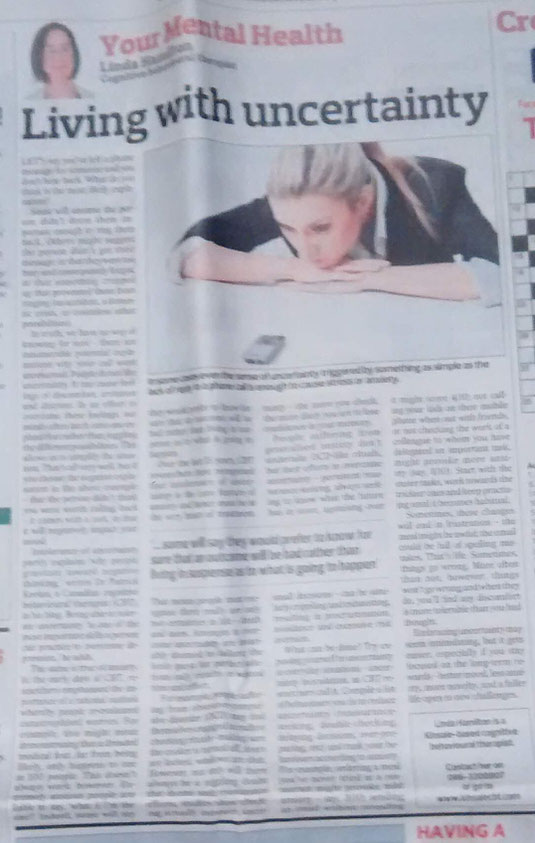
Last week's 'Your Mental Health' column (pictured opposite) explored how learning to tolerate uncertainty is an essential skill that can help alleviate depression and anxiety. The piece is pasted below.
Let’s say you’ve left a phone message for someone and you don’t hear back. What do you think is the most likely explanation?
Some will assume the person didn’t deem them important enough to ring them back. Others might suggest the person didn’t get their message, or that they were too busy and consequently forgot, or that something cropped up that prevented them from ringing (an accident, a domestic crisis, or countless other possibilities).
In truth, we have no way of knowing for sure – there are innumerable potential explanations why your call went unreturned. The inherent uncertainty of such situations can be irritating and stressful, and people often to decide to seize on one possible explanation rather than juggling different possibilities. Lessening uncertainty and ambiguity is all very well, but if you choose the negative explanation – that the person didn’t think you were worth calling back – it comes with a cost, in that it will negatively impact your mood.
Intolerance of uncertainty partly explains “why people gravitate toward negative thinking”, writes Dr Patrick Keelan, a Canadian cognitive behavioural therapist (CBT), in his blog. Being able to tolerate uncertainty “is one of the most important skills a person can practice to overcome depression”, he adds.
ANXIETY AND UNCERTAINTY
The same is true of anxiety. In the early days of CBT, researchers emphasised the importance of a rational outlook whereby people re-evaluated catastrophised worries. For example, this might mean demonstrating that a dreaded medical fear, far from being likely, only happens to one in 100 people. This doesn’t always work, however. Extremely anxious people are liable to say, “what if I’m the one?” Indeed, some will say they would prefer to know for sure than an outcome will be bad rather than living in suspense as to what is going to happen.
Over the last 15 years, CBT researchers have recognised that intolerance of uncertainty is the core feature of worry and hence must be at the very heart of treatment. That means people must recognise there really are only two certainties in life – death and taxes. Attempts to overcome uncertainty are invariably doomed to failure; the futile quest for perfect solutions only results in wasted time and effort.
For example, people suffering from obsessive-compulsive disorder (OCD) may find themselves engaged in endless checking rituals – making sure the cooker is turned off, doors are locked, windows are shut. However, not only will there always be a niggling doubt that dooms such reassurance efforts, studies show checking actually increases uncertainty – the more you check, the more likely you are to lose confidence in your memory.
People suffering from generalised anxiety don’t undertake OCD-like rituals, but their efforts to overcome uncertainty – persistent reassurance seeking, always seeking to know what the future has in store, agonising over small decisions – can be similarly crippling and exhausting, resulting in procrastination, avoidance and excessive risk aversion.
BEHAVIOURAL CHANGES
What can be done? Try exposing yourself to uncertainty in everyday situations – uncertainty inoculation, as CBT researchers call it. Compile a list of behaviours you do to reduce uncertainty (reassurance-seeking, double-checking, delaying decisions, over-preparing, etc) and rank your behaviours according to anxiety. For example, ordering a meal you’ve never tried at a restaurant might provoke mild anxiety – say, 3/10; sending an email without rereading it might score 4/10; not calling your kids on their mobile phone when out with friends, or not checking the work of a colleague to whom you have delegated an important task, might provoke more anxiety (say, 8/10). Start with the easier tasks, work towards the trickier ones and keep practising until it becomes habitual.
Sometimes, these changes will end in frustration – the meal might be awful; the email could be full of spelling mistakes. That’s life. Sometimes, things go wrong. More often than not, however, things won’t go wrong and when they do, you’ll find any discomfort is more tolerable than you had thought.
Embracing uncertainty may seem intimidating, but it gets easier, especially if you stay focused on the long-term rewards – better mood, less anxiety, more novelty, and a fuller life open to new challenges.
Write a comment